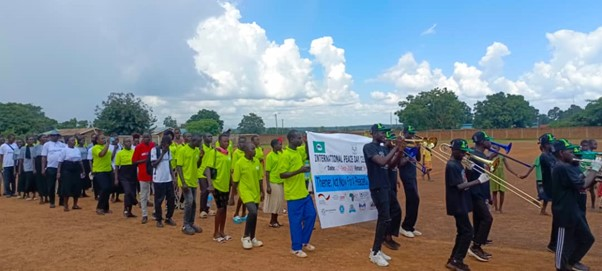From Warrior to Peacebuilder: Gabriel’s Journey of peacebuilding in South Sudan
- RSRTF South Sudan
- May 29, 2025
- 2 min read

“All my life, I thought death, war, and cattle raiding were normal,” says Gabriel Kunang, now a respected clerk at the chief’s court in Gany Payam, Unity State.
“To become a man in our culture, you had to be marked on the face and carry a gun.” In the Nuer tradition, facial markings are a rite of passage—symbols of strength, courage, and manhood.
For Gabriel, those marks came with a heavy burden. From a young age, he followed the path expected of him—raiding cattle, engaging in youth-led violence, and embracing the cycles of conflict that defined life in his region.
But violence came at a cost. During a confrontation with youth from another Payam, Gabriel struck someone on the head and was arrested. He spent six months in jail, an experience that changed him.
“I told my wife, ‘I have done something bad. I cannot stay here anymore.’” He left for Payinjar County, where he enrolled in a nine-month life skills training programme. The training gave him more than knowledge—it gave him purpose.
Returning home, Gabriel asked the commissioner for a job and was appointed a teacher at Patit Primary School. Though the post offered no government salary, local families paid him in grain. He embraced his new life, teaching children during the week and helping his wife in the fields on weekends.
Peace, however, was short-lived. When conflict broke out in 2013, Gabriel, like many others, was swept back into the violence. He rejoined armed youth and participated in raids across Mayendit, Leer, and Rubkona. In 2015, during a brutal clash between SPLM-IG and SPLM-IO forces in Koch, Gabriel experienced a devastating personal loss.
“Two of my brothers—one from each side—were killed in the same battle. I found them both lying dead.” That moment broke something in him.
“I took my gun and gave it to the commissioner. I told him, ‘I don’t want to fight anymore.’” The commissioner, surprised, detained Gabriel for two days. “He told me, ‘In South Sudan, when we fight, it is brothers who die.’”
Gabriel’s decision to abandon violence was further reinforced when the RSRTF-supported Area-Based Programme came to his community. Through the initiative, he received formal training on the rule of law.
For the first time, he truly understood the principles of justice, rights, and reconciliation. Empowered by this new understanding, Gabriel became a peace advocate, travelling to neighbouring Payams to speak with young people.
“I told them, ‘This time is different. Don’t raid cattle anymore. That person you’re stealing from might be your brother.’”
Now a father of 13, Gabriel is determined to raise his children differently. “I tell them, ‘You won’t get marks on your face like I did. No more fighting for cattle. If you must fight, fight with a pen—go to school, get an education. That’s the path to a better tomorrow.’”
His life is a living example of the transformation possible when communities are supported not just with aid, but with tools to break entrenched cycles of violence.
From a cattle raider to a courtroom clerk, from a prisoner to a teacher and peacebuilder, Gabriel’s journey mirrors the promise of South Sudan itself—scarred, but not broken.
Through programmes like RSRTF’s Area-Based Programming, communities like Gany Payam are rewriting their narratives, one story at a time.




Comments